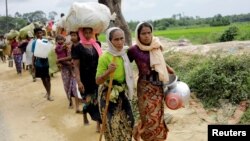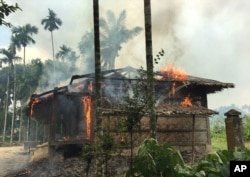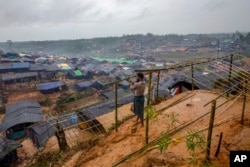The United Nations said Friday that 589,000 Rohingya refugees have fled Myanmar to Bangladesh since August 25.
Spokesman Farhan Haq told reporters that just over half of them are staying at a large site known as the Kutupalong Expansion, where aid partners are working to improve basic services, infrastructure and road access.
The president of aid group Refugees International, Eric Paul Schwartz, visited Bangladesh last month. He said that by early September, it was already clear from conversations with refugees that the situation had become ethnic cleansing and that crimes against humanity were taking place.
"What was so chilling was the consistency of the conversations we had with people about what had happened," Schwartz told an audience at the Council on Foreign Relations in New York. He said the Myanmar military would fire bomb villages, often unannounced or without warning, and as civilians fled they would systematically shoot them.
"Person after person after person told us the same story," he said. "If you want to push 580,000 people out of a country in six weeks, that's what you have to do. You have to terrorize them in ways that are sort of breathtaking," he added.
Humanitarian crisis
The U.N. and international partners are struggling to meet the needs of the constantly increasing refugee population. An international pledging conference is set for Monday in Geneva. It aims to raise $434 million to assist 1.2 million refugees through February 2018.
Almost 60 percent of the refugees are children, and the U.N. children's agency, UNICEF, says children are particularly threatened by desperate living conditions and waterborne diseases.
"Of course, many of them have been walking for days — thirsty, hungry, on foot — bare feet, exhausted," spokeswoman Duniya Aslam Khan told VOA in an interview Friday. "So, the children were sick and malnourished. They were stranded at the border for a few days and it was only Tuesday and Wednesday this week that we received a post that finally they were allowed to come in."
Khan said the priority among aid groups now is "decongesting the existing settlements" in Bangladesh, one of the most densely populated nations in the world, "providing decent living conditions, and providing better health and sanitation and hygiene assistance to the refugees."
Hygiene is a particular concern, Khan said, to stave off the spread of disease.
The agency has also called for access to Rohingya children who are still in Myanmar's northern Rakhine state — the agency has no access there.
Bangladesh's government also is trying to help the surging refugee population. It has designated a new 3,000-acre site to build shelters, but experts say that will take time to be inhabitable because access roads and provisions for water, sanitation and other basic services need to be made.
In the meantime, Bangladesh's military has moved refugees stranded near the border to several makeshift settlements, where they are being given food, water, medical checks and temporary shelter.
VOA's Marissa Melton contributed to this report.












